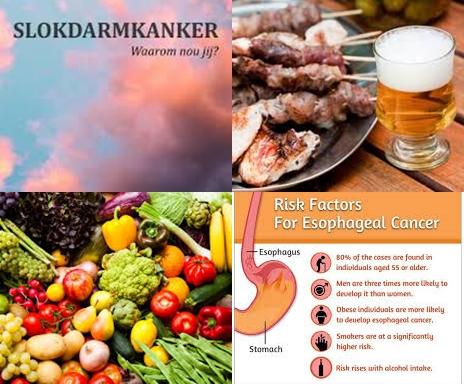
Objectives:
In the 2007 World Cancer Research Fund/American Institute for Cancer Research Second Expert Report, the expert panel judged that there was strong evidence that alcoholic drinks and body fatness increased esophageal cancer risk, whereas fruits and vegetables probably decreased its risk. The judgments were mainly based on case-control studies. As part of the Continuous Update Project (CUP), this review article (meta-analysis) has been conducted.
What is the relationship between nutrition and esophageal cancer risk?
Study design:
This review article included a total of 57 cohort studies, used in previous 13 meta-analyses.
Results and conclusions:
The investigators found a significant reduced risk of 11% for esophageal adenocarcinoma for every increment of 100g/day vegetable intake [RR = 0.89, 95% CI = 0.80-0.99, n = 3].
The investigators found a significant increased risk of 47% for esophageal adenocarcinoma for every 5 unit increment in BMI [RR = 1.47, 95% CI = 1.34-1.61, n = 9].
The investigators found a significant reduced risk of 16% for esophageal squamous cell carcinoma for every increment of 100g/day fruit intake [RR = 0.84, 95% CI = 0.75-0.94, n = 3].
The investigators found a significant reduced risk of 36% for esophageal squamous cell carcinoma for every 5 unit increment in BMI [RR = 0.64, 95% CI = 0.56-0.73, n = 8].
The investigators found a significant increased risk of 59% for esophageal squamous cell carcinoma for every increment of 50g/day processed meat intake [RR = 1.59, 95% CI = 1.11-2.28, n = 3].
The investigators found a significant increased risk of 37% for esophageal squamous cell carcinoma for every increment of 100g/day processed and red meat intake [RR = 1.37, 95% CI = 1.04-1.82, n = 3].
The investigators found a significant increased risk of 25% for esophageal squamous cell carcinoma for every increment of 10g/day alcohol intake [RR = 1.25, 95% CI = 1.12-1.41, n = 6].
The investigators concluded evidence from cohort studies shows a protective role of vegetables and body weight control in esophageal adenocarcinomas development. For squamous cell carcinomas, higher intakes of red and processed meats and alcohol increase the risk, whereas fruits intake has a protective role.
Original title:
An update of the WCRF/AICR systematic literature review and meta-analysis on dietary and anthropometric factors and esophageal cancer risk by Vingeliene S, Chan DSM, […], Norat T.
Link:
https://www.ncbi.nlm.nih.gov/pubmed/28666313
Additional information of El Mondo:
Find more information/studies on vegetable, fruit, alcohol and meat consumption, significant/cohort/95% CI and cancer right here.